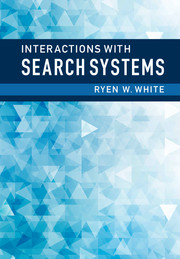Book contents
- Frontmatter
- Dedication
- Contents
- Preface
- 1 Introduction
- Part I Background
- Part II System SupportHelping People Search
- 5 Helping People Search
- 6 Exploration, Complexity, and Discovery
- 7 Learning and Use
- 8 Interaction beyond the Individual
- 9 Personalization and Contextualization
- Part III Evaluation
- Part IV Opportunities and Challenges
- Notes
- References
- Index
- Plate section
5 - Helping People Search
from Part II - System SupportHelping People Search
Published online by Cambridge University Press: 05 March 2016
- Frontmatter
- Dedication
- Contents
- Preface
- 1 Introduction
- Part I Background
- Part II System SupportHelping People Search
- 5 Helping People Search
- 6 Exploration, Complexity, and Discovery
- 7 Learning and Use
- 8 Interaction beyond the Individual
- 9 Personalization and Contextualization
- Part III Evaluation
- Part IV Opportunities and Challenges
- Notes
- References
- Index
- Plate section
Summary
The previous chapters have targeted actions that are useful as signals in models of relevance and satisfaction, as well as models of information seeking and use that have been developed to better understand the search process. One of the largest changes in information systems over the past few decades has been the transformation of search systems from tools that are used only by trained experts (such as reference librarians) to applications and services for the general population. In the early 1980s, researchers argued that information retrieval may become an elite activity unless search interfaces became easier for novices to use (Ingwersen, 1984). Supporting searching by the general populace involves both the simplification of query construction and result examination, as well as the introduction of tools to help people build queries and consider the results returned. In this chapter, I turn my attention to the mechanisms that have been developed to help people search. I focus on the search experience and searcher-facing components in particular, rather than the sophisticated methods employed during crawling, indexing, and ranking. Ranking algorithms and other backend components have been covered at length by other scholars (e.g., Manning et al., 2008; Croft et al., 2010); however, much still remains to be learned about the complexity of various interactive processes in search, and particularly about the effects of the variables involved (Belkin and Croft, 1992). Others provide excellent summaries of the history of search interfaces; both up to the end of past century (Marchionini and Komlodi, 1998; Shneiderman et al., 1999), and more recently (Hearst, 2009).
Emerging interest in areas such as human-computer information retrieval (HCIR) (Marchionini, 2006b) has directed attention toward the need to support users engaged in complex tasks and support more than simply information finding tasks. Information finding is handled well by existing search technologies. One of the central tenets of the design of search systems has been the need for searchers to assume control and responsibility over the search process. Search systems can offer assistance to searchers in performing their search tasks, but to benefit most from the search process, searchers must be engaged in the process and be responsible for their actions and the outcomes of the search.
- Type
- Chapter
- Information
- Interactions with Search Systems , pp. 141 - 200Publisher: Cambridge University PressPrint publication year: 2016



